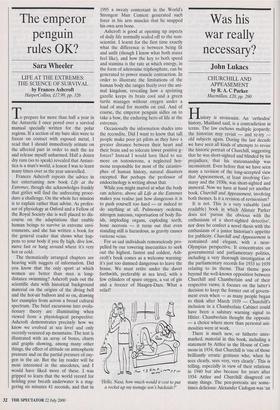The emperor penguin rules OK?
Sara Wheeler
LIFE AT THE EXTREMES: THE SCIENCE OF SURVIVAL by Frances Ashcroft HarperCollins, f17.99, pp. 326 To prepare for more than half a year in the Antarctic I once pored over a survival manual specially written for the polar regions. If a section of my bare skin were to freeze on contact with exposed metal, I read that I should immediately urinate on the affected part in order to melt the ice and release myself unharmed. Half a dozen thy runs (so to speak) revealed that Antarc- tica is a man's world, a lesson I was to learn many times over as the year unravelled.
Frances Ashcroft repeats the advice in her entertaining new book Life at the Extremes, though she acknowledges franldy that girlies will find the unfreezing proce- dure a challenge. On the whole her mission is to explain rather than advise. As profes- sor of physiology at Oxford and a Fellow of the Royal Society she is well placed to dis- course on the adaptations that enable human beings to survive in extreme envi- ronments, and she has written a book for the general reader that shows what hap- pens to your body if you fly high, dive low, move fast or hang around where it's very hot or cold.
The thematically arranged chapters are heaving with nuggets of information. Did you know that the only sport at which women are better than men is long- distance swimming? Ashcroft pads out the scientific data with historical background material on the origins of the diving bell and the hot-air balloon and so on, drawing her examples from across a broad cultural spectrum. The brief excursions into evolu- tionary theory are illuminating when viewed from a physiological perspective: Ashcroft demonstrates precisely how we know we evolved at sea level and only recently ventured up mountains. The text is illustrated with an array of boxes, charts and graphs showing, among many other things, the effect of altitude on atmospheric pressure and on the partial pressure of oxy- gen in the air. But the lay reader will be most interested in the anecdotes, and I would have liked more of these. I was gripped to learn that the world record for holding your breath underwater is a stag- gering six minutes 41 seconds, and that in 1995 a sweaty contestant in the World's Strongest Man Contest generated such force in his arm muscles that he snapped his own arm bone.
Ashcroft is good at opening up aspects of daily life normally sealed off to the non- scientist. I learnt for the first time exactly what the difference is between being fit and unfit (though I know what both states feel like), and how the key to both speed and stamina is the rate at which energy, in the form of adenosine triphosphate, can be generated to power muscle contraction. In order to illustrate the limitations of the human body she ranges freely over the ani- mal kingdom, revealing how a sprinting gazelle keeps its brain cool and a green turtle manages without oxygen under a load of mud for months on end. And of course, the emperor penguin sidles on to take a bow, the enduring hero of life at the extremes.
Occasionally the information shades into the recondite. Did I want to know that tall people make poor jet pilots as they have a greater distance between their heart and their brain and so tolerate lower positive g- forces? Instead I would have liked to see more on testosterone, a neglected hor- mone responsible for most of the catastro- phes of human history, natural disasters excepted. But perhaps the professor of endocrinology is writing about that.
While you might marvel at what the body can achieve, above all Life at the Extremes makes you realise just how dangerous it is to push yourself too hard — or indeed to do anything at all. Pulmonary oedema, nitrogen narcosis, vaporisation of body flu- ids, imploding organs, exploding teeth, bone necrosis — it turns out that even standing still is hazardous, as gravity causes varicose veins.
For us sad individuals remorselessly pro- pelled by our towering insecurities to seek out the highest, fastest and coldest, Ash- croft's book comes as a welcome warning: it's just too damned dangerous to leave the house. We must retire under the duvet forthwith, preferably at sea level, with a few cylinders of spare oxygen, a vat of gin and a freezer of Haagen-Dazs. What a relief!
`Hello, Nasa, how much would it cost to put a rocket up my teenage son's backside?'


























































 Previous page
Previous page